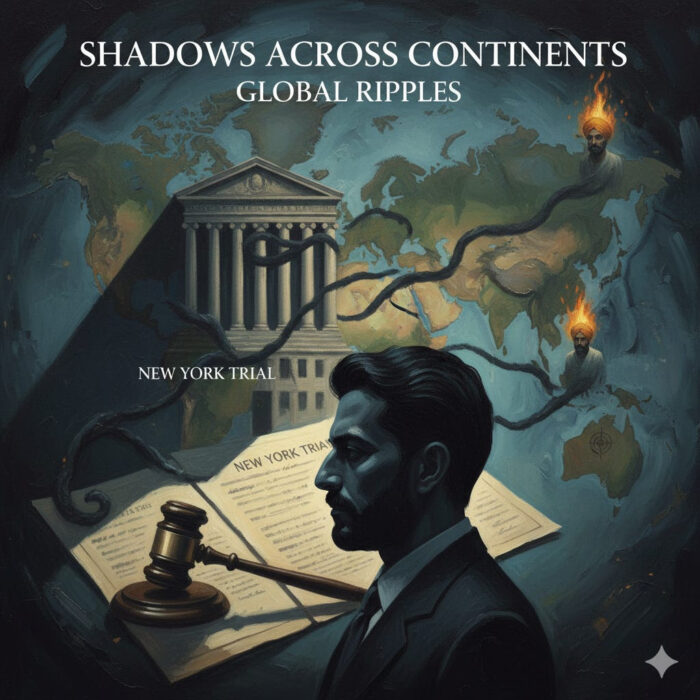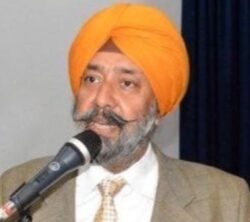 The much-publicised murder-for-hire case against Nikhil Gupta, an Indian national accused of plotting to assassinate the self-styled Khalistan activist Gurpatwant Singh Pannun on U.S. soil, has been postponed by the U.S. District Court in New York. The trial, initially scheduled to begin on November 3, 2025, was delayed after Gupta sought to represent himself, alleging misconduct by his court-appointed attorney. Judge Victor Marrero accepted his motion, appointed a new public defender, and scheduled a pre-trial conference for November 14 to determine the new trial date.
The much-publicised murder-for-hire case against Nikhil Gupta, an Indian national accused of plotting to assassinate the self-styled Khalistan activist Gurpatwant Singh Pannun on U.S. soil, has been postponed by the U.S. District Court in New York. The trial, initially scheduled to begin on November 3, 2025, was delayed after Gupta sought to represent himself, alleging misconduct by his court-appointed attorney. Judge Victor Marrero accepted his motion, appointed a new public defender, and scheduled a pre-trial conference for November 14 to determine the new trial date.
The Charges and Background
Gupta faces murder-for-hire and conspiracy charges for allegedly coordinating with Vikash Yadav, a former CRPF officer on deputaion with India’s Research and Analysis Wing (RAW), to arrange Pannun’s assassination. U.S. authorities describe Gupta as a narcotics and arms trafficker. According to court filings, an Indian official identified as Yadav allegedly offered Gupta $100,000 to facilitate the killing. Gupta was arrested in Czechia in June 2023 and extradited to the United States in June 2024. He has pleaded not guilty to all charges.
How the Plot Was Foiled
The alleged conspiracy was uncovered when Gupta attempted to contact intermediaries he believed could execute the assassination. Unbeknownst to him, both the middleman and the hired “hitman” were working with U.S. federal agents. The intermediary was a DEA informant, while the supposed assassin was an undercover agent. Gupta allegedly handed over a $15,000 advance as part of the payment. Federal prosecutors also claim to possess wiretap evidence showing Gupta discussing the recent killing of Hardeep Singh Nijjar in Canada and displaying a video of the murder to the informant, suggesting it was an example of how “targets” could be dealt with.
The Intended Target: Gurpatwant Singh Pannun
Gurpatwant Singh Pannun, now a naturalised U.S. citizen, is lawyer based in New York, and claims to be the founder and general counsel of Sikhs for Justice (SFJ), a group advocating for an independent sovereign Sikh state, “Khalistan.” Born in Amritsar, Punjab, and settled in the U.S. since 1992, Pannun has led the Khalistan Referendum campaign, which seeks to gauge global Sikh sentiment on independence. India designated him a terrorist in 2020, alleging anti-national activity, while Pannun maintains that his activism is lawful and peaceful. Following news of the assassination plot, he reportedly tightened personal security and limited public appearances.

The Nijjar Connection
Although Gupta is not charged in the killing of Hardeep Singh Nijjar, a Canadian Sikh leader shot dead in Surrey, British Columbia, in June 2023, U.S. prosecutors intend to link that incident to the New York plot. Nijjar, president of the Guru Nanak Sikh Gurdwara in Surrey and a close associate of Pannun, was a vocal proponent of the Khalistan movement. In September 2023, Canadian Prime Minister Justin Trudeau claimed there were “credible allegations” connecting Indian agents to Nijjar’s murder, a charge India firmly denied.
Prosecutors assert that both plots—against Pannun and Nijjar—share operational similarities, including the involvement of Vikash Yadav, who they describe as a central figure coordinating multiple targets. Reports also suggest that conspirators had identified at least three other individuals, including one in Nepal or Pakistan, as potential targets.
Evidence Expected at Trial
The prosecution has outlined a wide range of evidence it intends to introduce, including:
Wiretapped communications between Gupta and a confidential DEA informant;
Video and audio recordings of Gupta’s meetings with an undercover agent posing as a contract killer;
Digital exchanges between Gupta and Yadav discussing logistics, weapons, and payments;
Gmail and financial records establishing contact between Gupta and Indian government personnel; and
Footage of Nijjar’s killing, allegedly shown by Gupta to encourage the supposed hitman to proceed with the Pannun operation.
Prosecutors argue this evidence establishes a consistent “modus operandi,” linking the New York and Surrey incidents.
The Representation Dispute
Gupta’s request to delay the trial stemmed from his deteriorating relationship with court-appointed lawyer Matthew Laroche. In filings to Judge Marrero, Gupta accused Laroche of being “disinclined to defend vigorously” after discussions with prosecutors and of failing to file a motion to dismiss charges. The court subsequently replaced Laroche with David Touger, a reputed New York public defender. Nonetheless, Gupta continues to seek self-representation, a right that must be formally validated by the judge before trial proceedings can resume.
India’s Official Response
The Government of India has acknowledged that Vikash Yadav may have had some connection to the alleged conspiracy but maintains that he acted without official sanction, describing him as a “rogue actor.” Indian officials have consistently denied any state involvement in the killing of Hardeep Singh Nijjar and rejected suggestions of orchestrating attacks on foreign soil. They also point out that prior to Nijjar’s relocation to Canada, India had submitted a dossier of serious criminal offences, including terrorist activities, allegedly committed by him on Indian territory.
Nevertheless, the emergence of new evidence purportedly linking Yadav and Gupta could blur this distinction. If the court concludes that the coordination extended to serving officials, the proceedings may carry significant diplomatic implications—particularly at a time when New Delhi and Ottawa are seeking to normalise relations after months of tension.
Diplomatic and Legal Implications
The Gupta case has attracted global attention because it lies at the intersection of law enforcement, intelligence operations, and international diplomacy. While the U.S. treats it as a criminal conspiracy under domestic law, the Indian government views it through the lens of national security and diaspora radicalisation. The outcome may influence how nations handle transnational plots allegedly involving state-linked individuals.
At the same time, analysts caution against premature conclusions. Extradition complexities, classified evidence, and overlapping criminal jurisdictions make this a legally intricate case. The U.S. has reportedly considered seeking Yadav’s extradition, but his ongoing criminal proceedings in India—where he faces separate charges of attempted murder and extortion—are likely to delay any such move.
Broader Context: State Accountability and Diaspora Politics
The case unfolds against a backdrop of rising tensions over Sikh separatism abroad. Several Western nations, particularly Canada, the U.K., and the U.S., have witnessed protests and incidents linked to the Khalistan movement. India argues that certain diaspora networks have provided ideological and financial support to extremist offshoots. Western governments, meanwhile, maintain that peaceful advocacy remains protected speech.
The Gupta trial, therefore, extends beyond individual guilt or innocence—it will test how democracies navigate allegations of extraterritorial targeting, the use of covert intelligence, and the limits of acceptable state action.
The Road Ahead
As the Southern District of New York prepares for the rescheduled trial, all parties remain under close scrutiny. For U.S. prosecutors, the challenge lies in proving intent and coordination beyond reasonable doubt; for India, the focus will be on upholding its denial of institutional involvement while ensuring that individual accountability, if any, is addressed through proper legal channels.
Ultimately, the case will unfold in a courtroom, not a press conference. Whether it reveals a rogue operation, a larger network, or a misinterpreted chain of communications, the proceedings will have implications far beyond the fate of one defendant—shaping international discourse on law, sovereignty, and the boundaries of intelligence activity.